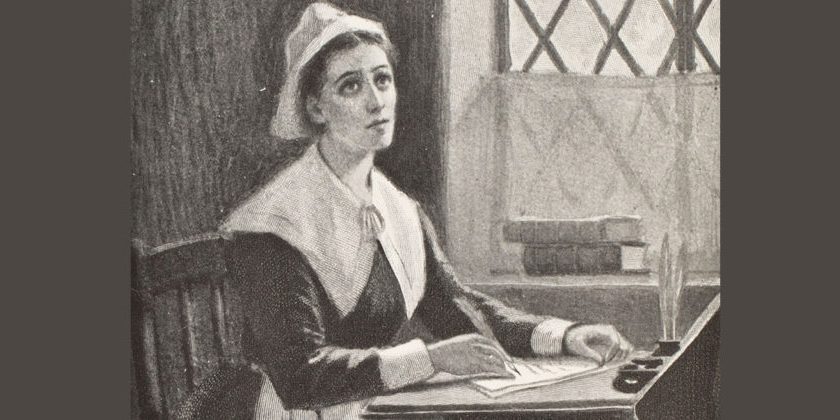
Why Pastors Should Engage Anne Bradstreet
Anne Bradstreet was the first person to publish a book of poetry in America and the first female Puritan I encountered. One day at work I went into the stacks to quickly reference a set of her poems; an hour later, I found myself sitting on the floor of the aisle having read the entire book. Something about her candid retellings of universal human experiences, all expressed as a person whose inner life was governed by a devotion to God, scripture, and holiness, had caused my body to freeze on the outside and my heart to bounce around on the inside. But what had also struck me was something I heard about from other female scholars and never gone through myself, namely, a sense of shared experience with a woman in history. Since I encountered Bradstreet, I have taught about her in a number of church and school settings, and continually get positive feedback from women of all ages. Here are some reasons why pastors should too:
Bradstreet’s Poetry Honestly Grapples with Universal Human Experiences from a Christian Perspective
Every part of pastoral work—whether it is preaching, teaching, counseling, or just being around—involves helping people, and all people go through the same general experiences in life though certain aspects of each person’s life are unique. Thus, Bradstreet’s poems can be used as tools for helping people through these experiences by facilitating lament, thanksgiving, and supplication. Scholars agree that Bradstreet’s later poems—all about her own life rather than the lofty ideas found in her earlier poems—are her best work. In my opinion, this is partly true because they provide direct access to the intimate details of her thoughts and emotions; these are not mediated by eloquent language or impressive allusions, but are often the initial, raw feelings jotted down in the heat of the moment. This intensity is only heightened for Christians, as both reader and author have been influenced by the same books and the same God.
For example, Bradstreet was often sick, but always turned to God for relief of pain and comfort in it. In one of her several poems on the subject, “From Another Sore Fit,” she wrote,
In my distress I sought the Lord
When naught on earth could comfort give,
And when my soul these things abhorred,
Then, Lord, Thou said’st unto me, ‘Live.’
Thou knowest the sorrows that I felt;
My plaints and groans were heard of Thee,
And how in sweat I seemed to melt
Thou help’st and Thou regardest me.
My wasted flesh Thou didst restore,
My feeble loins didst gird with strength,
Yea, when I was most low and poor,
I said I shall praise Thee at length.[1]
Bradstreet was also separated from her husband when he travelled to England, causing her to write “In My Solitary Hours in My Dear Husband His Absence.” In the first half, she expresses her loneliness and fears but finds closeness with and hope in God:
O Lord, Thou hear’st my daily moan
And see’st my dropping tears.
My troubles all are Thee before,
My longings and my fears.
Thou hitherto hast been my God;
Thy help my soul hath found.
Though loss and sickness me assailed,
Through Thee I’ve kept my ground.
And Thy abode Thou’st made with me;
With Thee my soul can talk;
In secret places Thee I find
Where I do kneel or walk.
Though husband dear be from me gone,
Whom I do love so well,
I have a more beloved one
Whose comforts far excel…[2]
In my favourite poem, of which the full title is “Here Follows Some Verses Upon the Burning of Our House July 10th, 1666, Copied Out of a Loose Paper,” she laments the loss of her earthly home and turns to hope for her heavenly home. After awaking to the sound of screams of “Fire!” she ran out of her house and watched it burn, writing,
And when I could no longer look,
I blest His name that gave and took,
That laid my goods now in the dust.
Yea, so it was, and so ‘twas just.
It was His own, it was not mine,
Far be it that I should repine;
He might of all justly bereft
But yet sufficient for us left.
When by the ruins oft I past
My sorrowing eyes aside did cast,
And here and there the places spy
Where oft I sat and long did lie:
Here stood that trunk, and there that chest,
There lay that store I counted best.
…
Then straight I ‘gin my heart to chide,
And did thy wealth on earth abide?
Didst fix thy hope on mold’ring dust?
The arm of flesh didst make thy trust?
Raise up thy thoughts above the sky
That dunghill mists away may fly.
Thou has a house on high erect,
Framed by that mighty Architect,…[3]
Bradstreet’s Poetry Honestly Grapples with Unique Female Experiences from a Christian Perspective
In addition to grappling with universal human experiences, Bradstreet’s poetry also grapples with unique female experiences like giving birth, raising children, and being affected by unbiblical cultural norms. She hides no thought or emotion, and brings scripture and theology to bear on these sincere reactions to trying circumstances. Share on X
For example, in her “Prologue” she responds to those who say she’s of better use as a housekeeper than a poet, and will say she plagiarized her work if it ends up being successful. She sarcastically admits men can write better poetry, but if she could also contribute to this work it it would only enhance theirs, and she would only receive the modest reward of a thyme and parsley wreath (which her educated readers would know was actually given to Greek Olympic athletes):
I am obnoxious to each carping tongue
Who says my hand a needle better fits.
A Poet’s Pen all scorn I should thus wrong,
For such despite they cast on female wits.
If what I do prove well, it won’t advance,
They’ll say it’s stol’n, or else it was by chance.
…
Let Greeks be Greeks, and Women what they are.
Men have precedency and still excel;
It is but vain unjustly to wage war.
Men can do best, and Women know it well.
Preeminence in all and each is yours;
Yet grant some small acknowledgement of ours.
And oh ye high flown quills that soar the skies,
And ever with your prey still catch your praise,
If e’er you deign these lowly lines your eyes,
Give thyme or Parsley wreath, I ask no Bays.
This mean and unrefined ore of mine
Will make your glist’ring gold but more to shine.[4]
Though one should remember that each woman has different experiences and opinions, and that men can also go through similar experiences, women may especially resonate with Bradstreet’s poems.
In sum, Bradstreet’s poetry is worth reading and sharing because it honestly grapples with universal human experiences as well as unique female experiences as a Christian. She hides no thought or emotion, and brings scripture and theology to bear on these sincere reactions to trying circumstances. Some may feel reading poetry is difficult or unpleasant, but Bradstreet makes it easy. In fact, a few lines of poetry might be just the right kind of literature to use in aspects of public worship, like sermons, as well as private worship, like meditation, since they are short but deep, encouraging the reader to fully recognize herself and then bring that self to God.
Endnotes
[1] Anne Bradstreet, The Works of Anne Bradstreet (ed. Jeannine Hensley, Cambridge: Belknap Press of Harvard University Press, 1981), 248.
[2] Bradstreet, Works, 267.
[3] Ibid., 292–293.
[4] Ibid., 16–17.

